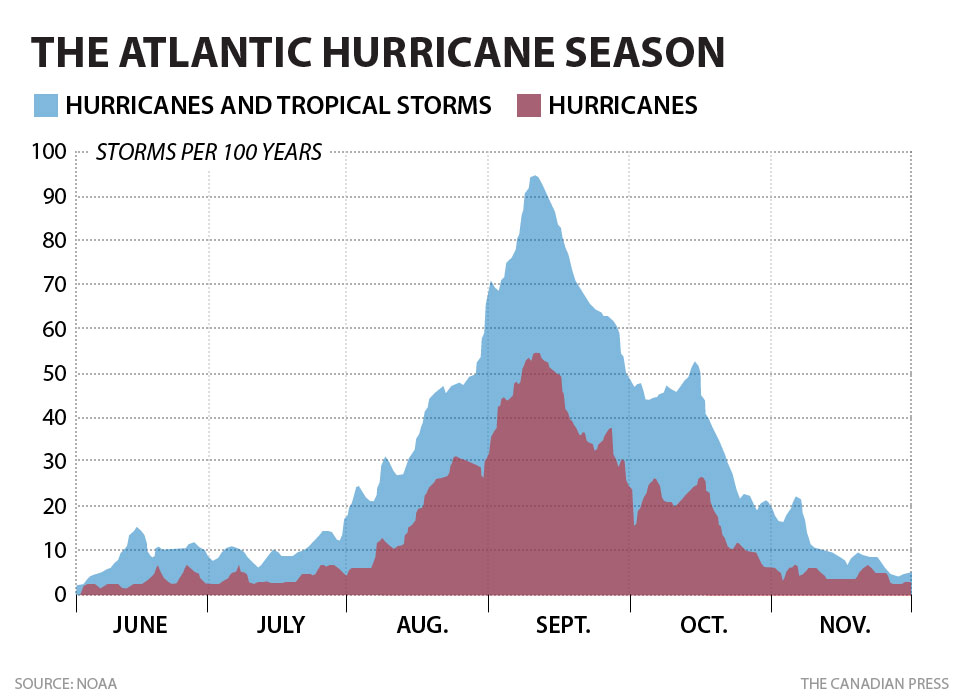HALIFAX – It has been a lacklustre season for hurricanes, and now questions are being raised about how the storms are forecast.

The United States National Oceanic and Atmospheric Administration predicted between seven and 11 hurricanes, beginning June 1.
READ MORE: Atlantic hurricane season predictions fall flat
However, there have only been two hurricanes, Ingrid and Humberto, and Nova Scotia was only hit by post-tropical Andrea and Gabrielle.
Chris Fogarty, manager of the Canadian Hurricane Centre, said the reason behind the quiet season could be unfavourable conditions where hurricanes typically form.
“Of course to get hurricanes, you need cloud cover and development. We’ve seen a lot of dry air and lack of cloud coverage in the tropics this year,” he said.
Fogarty said it’s quite rare for there to be only two storms in a hurricane season — the last one with so few was in the mid-to-early 1990s.
The Atlantic Hurricane Season:
One theory he had is that we could be entering a 20-year “quiet period” after about 20 years of hyperactivity, although he said only time will tell whether that’s the case.
Fogarty recommends future long-range forecasts be qualitative rather than quantitative “whether it’s average or above average.”
He stressed that forecasting is extremely difficult and while this year might have been a bust measured by the number of predicted hurricanes, he strongly advises against thinking it is a long-term trend.
“Usually we’re predicting a storm coming and we get it. Sometimes it doesn’t pan out but we still need to pay attention,” he said. “We always need to be aware we are somewhat vulnerable to hurricanes here in the higher latitudes in Canada.”
Ian Folkins, associate professor of atmospheric science at Dalhousie University, said he thinks quantitative hurricane forecasting hurts the credibility of the people making the predictions.
“The public wants a number so I think these organizations feel obliged to meet that demand,” he said. “I think it leads to some decrease in the credibility of science and hurricane forecasting in general to take these forecasts too seriously.”
He said although weather patterns are a science, Mother Nature sometimes has plans of her own.
“It’s very hard to predict year to year what hurricane frequency should be,” he said.
- What is a halal mortgage? How interest-free home financing works in Canada
- Ontario doctors offer solutions to help address shortage of family physicians
- Capital gains changes are ‘really fair,’ Freeland says, as doctors cry foul
- Canada will take bigger economic hit than U.S. if Trump wins election: report
But regardless of what’s predicted, emergency officials say you should always be prepared.
Rhona Kenney, director of disaster management for the Atlantic division of the Red Cross, said families should pack an emergency kit, whether a hurricane is forecast or not.
“We never want to become too complacent around disasters and emergency preparedness,” she said.
READ MORE: Then and now: Recovery after Hurricane Sandy
While some say forecasting should not be quantitative, Kenney said the Red Cross uses the numbers for planning purposes.
“As a result of that, we build our team, we build our resources — both our human resources through volunteer and development training and our physical resources through ensuring we have the equipment and capacity to be able to respond if there is any emergency,” she said.
As the hurricane season begins to wind down, Fogarty said the likelihood of a new hurricane forming is slim.
“If anything does form, it will be in the Gulf of Mexico or Caribbean Sea,” he said. “Once you get into November, you don’t have a lot of storms forming in the traditional areas.”



Comments